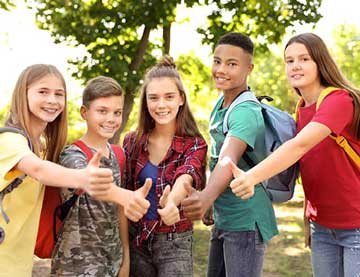Banner Image

What are you looking for on your next school camp? An isolated bush environment where students can test their self-sufficiency skills? An historical experience where the setting echoes recent learnings in the classroom? Or an active camp to keep your students moving? We look at the different offerings – and how they can help your students learn and grow.
Defining your camp’s desired purpose will help you plan a successful event and ensure both you and your students get the best outcome possible.
Before you choose a camp consider:
- the purpose of the camp
- what you want your students to have achieved at the end of the camp
- the links with learning the camp may offer
- the style of camp you are looking for.
Choosing your school camp
Now comes the fun part – choosing your school camp venue!
The Australian Directory of School Activities, Excursions and Accommodation is jam-packed with great ideas and snapshots of thousands of unique educational camp experiences, but before you start investigating the options there are some core considerations for picking your ideal camp:
- How self-sufficient do you expect your students to be? This question is super important, and will drive your venue hunt. Some camp providers encourage students to sleep under the stars and cook their own food, while other camp providers offer a fully-catered experience, with meals provided and students sleeping in bunk-style dormitories. What do you want for your students?
- Do you want your camp to link with your classroom learning? The most common curriculum links focus on personal, social and community health; movement and physical activity; and self-awareness and management. Other common curriculum areas include geography and the arts. Most camp providers can provide curriculum-based reference materials. Work with your camp provider to ensure the program relates to your learning priorities. Source https://www.vic.gov.au/before-choosing-school-camp
Top tip: Camps offer an ideal opportunity to explore cross-curriculum priorities such as Aboriginal and Torres Strait Islander histories and cultures and sustainability.
- Is one of your key aims to shift students and staff to new contexts? School camp brings with it many opportunities to build relationships with fellow students and staff. The child who is confident and boisterous in class may be vulnerable and homesick on camp; while the quiet student who rarely offers their input into class discussion may shine as a leader during camp activities. Choose a camp that allows your students to grow and discover what their strengths and challenges are.
- Are you looking for an ‘active’ camp or a tranquil, nature-based experience? Some camps are focussed on keeping students busy and active, to encourage teamwork, collaboration, self-development and leadership. They’re a great option for building relationships and independence through being away from home. These camps are high energy – and lots of fun. But maybe you’re looking for a more tranquil, nature-based camp, where students can put into practice some of their classroom learnings about climate change and the environment, or First Nations histories and cultures. These camps generally move at a slower pace, and encourage hands-on learning, problem-solving, school connectedness and teamwork and communication.
Top tip: Regardless of whether you choose an active camp or nature-based camp, make sure you have on hand some self-directed skill-based games, such as quoits, skittles or bocce for students to play during free time. These activities encourage students to socialise and can provide a welcome distraction from any screen-deprivation that may creep in!
Determining what is right for your individual school camp needs and goals will help ensure a positive camp experience for all.
For more ideas on school camps, activities and excursions, visit our Search Listings.
